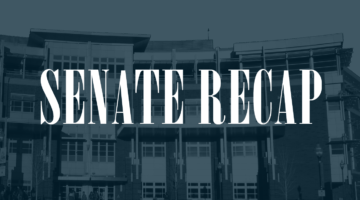
Andrea Wilkinson/The Nevada Sagebrush
Zachariah Simms, a Senate candidate from the Reynolds School of Journalism, speaking at the ASUN Senator debates on Feb. 27, 2018 in the ballrooms at the Joe Crowley Student Union.
The Associated Students of the University of Nevada will hold its annual elections. Many of you don’t give a rat’s ass. I feel you. We’ve all got better things to worry about. But, these student government representatives should be held accountable, if for no other reason than we’re paying them.
I’ve been an ASUN Senator and a member of the ASUN Executive Branch throughout my way-too-long career at this University. I feel like I have a good grasp on what it’s like to be an elected representative (even though I was never elected), and I can tell you it wasn’t easy. Actually, sometimes it was very easy. But, it shouldn’t be that easy. It was hard knowing you are paid to work for the students, but easy when you realize most students won’t hold you accountable.
Voter turnout for ASUN elections is disturbingly low every year. Last year,was the best turnout in some time, and it was around 25 percent of undergraduate students. And maybe that was because the favored presidential candidate was exposed for tweeting racist and homophobic slurs. Consistently low turnout might have something to do with students’ general attitudes toward the organization. It’s a club for Greeks. It doesn’t actually do anything. They plan shitty concerts. They’re all in Coffin and Keys. Some of these criticisms are warranted, but they are no reason to disengage with the process. ASUN does good if the right people are elected.
I urge every student to participate in this year’s election. Ask your candidates tough questions, and hold them to their answers when they’re in office. The following are a few questions I think you should ask yourself about the candidate(s) you plan to vote for and questions your candidates should be able to answer.
Senate candidates
Debates for Senate candidates were held over the last couple weeks. Moderators probably asked questions like “Where do you see yourself in 10 years?” or “What are your weaknesses?” or “What is your campaign platform?” which are all listed already on the ASUN website. After watching these debates, here are some questions you should ask yourself about the candidates you are considering.
Did my candidate mention any legislation from past sessions?
Senators need to know their stuff. They don’t have to be ASUN policy experts, they don’t even have to have a background in politics, but they should know at least one piece of legislation that was considered in the last session.
In real world politics, candidates live and die based on the policies they support or oppose. How did you vote on gun control? How do you plan to vote on tax reform?
Often, these types of big-picture questions are asked of ASUN Senate candidates during debates. Before we ask whether our candidates will support DACA students or tuition increases (questions that are quite easy to BS), let’s make sure they know something about what the Senate has done in the past.
Let’s ask if they’ve ever heard of a bill passed by the Senate. Then, we can find out which candidates are for real and which ones are running to pad their resumes.
Did my candidate mention anything about the committees they would like to sit on?
The Senate is made up of the main body and separate committees. Senators are required to sit on and participate in at least a couple of these committees. These meetings are where the bulk of the work is done for senators. This is where they decide what campus issues they’re most interested in, and they discuss ways to address those issues with like-minded fellow senators.
Legislation starts in committee. If the Committee on Academics decides to do a survey on how students feel about teachers carrying firearms, the committee will conduct the survey, write a bill and send it off to the Senate body to approve.
Candidates should be aware of how this process works. They should know which committees they want to sit on and why. And, their campaign goals and promises should reflect what committees they’re likely to select. If their goal is to ensure students with disabilities have the proper resources, the candidate should be eager to join the University Affairs Committees (and prepared to tell the Disability Resource Center on campus what they’re doing wrong). If the candidate’s goal is to work with local businesses to create and promote internships for students they should be running for Vice President, not Senator because the VP oversees the Pack Internship Grant Program.
Is my candidate likely to resign?
This might seem like a joke, but it’s not. In recent sessions, the Senate has been plagued by resignations. If your candidate doesn’t seem 100 percent committed, cross them off the list now. When a candidate resigns, their seat is filled by appointment, not election. That’s how I got the job when I was a Senator. My predecessor resigned, and I applied for the job online. I didn’t have to campaign and nobody in my college voted for me. I answered questions posed by the Senators who were already elected and they agreed to let me join their group. That’s not how a candidate should be vetted. No Senator, after that sort of hiring process, will feel the same sense of responsibility to their constituents as a candidate that was elected by their constituents.
President/Vice President Candidates
Your ASUN President and Vice President have already been decided because each candidate is running unopposed. This is unfortunate, but it doesn’t mean they can’t be asked tough questions. Presidential and vice presidential debates are happening next week. I don’t know how a debate works with one candidate, but I know it’s a great opportunity to ask the future President, Hannah Jackson, and VP, Carissa Bradley, what they plan to do once in office. Here’s what you should consider asking:
What issues do you think students want to see addressed within student government?
Chief officer of the student government is a big job, obviously, as you meet with various groups, represent the students in the community and local government (next year will include a Nevada state legislative session) and act as the face of the student body. The President will be talking about big issues every day. She’ll meet with President Johnson regularly, she’ll guide policy in the Senate (because senators usually need help with that) and she’ll probably testify at the Nevada Legislature. It would be easy to get caught up in the job and forget what students really care about.
Ask her what she thinks students expect from their president. Ask if she’s planning on addressing the things you care about. I, for one, care about free speech on campus. I might ask future President Jackson how she plans to address that. Maybe you care about parking. Ask her if she plans to advocate for more parking on campus. Just kidding, don’t waste your breath. The answer is a resounding negatory.
What do you think the ASUN budget should provide for students?
ASUN works with a nearly $3 million budget. The first thing an ASUN President does in office is set the budget. This money is appropriated for various services like Campus Escort and the campus food pantry, it pays professional staff salaries and it funds campus programs.
That $3 million is funded by student fees, and it’s meant to provide students with services and programs so they get their money’s worth. The President should know what these services are and how this money is spent. They are responsible for making sure everyone else in ASUN is spending money the right way.
How will you decide on the best candidates to fill your cabinet?
The President’s Cabinet can be a bit clubbish. Not the dance music, grinding and expensive drinks kind of club, but the kind of club where you hire your friends to fill important positions. Often, Presidents and Vice Presidents do fill their cabinet with their friends that worked with them in the Senate the previous year. I’m not saying Jackson and Bradley will do that, but it wouldn’t hurt to ask.
The president’s Cabinet includes positions like Chief of Staff, Director of Programming, Director of Legislative Affairs and other positions which come with a hefty stipend. Candidates are selected through an interview process with the President and VP and are approved in the Senate. I wouldn’t bank on that process producing the best candidates for these positions. So, we should ask the executives before-hand how they plan on selecting them.
Will there be good concerts next year?
ASUN provides fantastic services for students. They use their budget to give safe rides to students, feed students in need, give money to clubs and fund internships for students. But, let’s be real, the most talked about and usually most controversial program that ASUN puts on every year is a concert. At some universities the student government exists for the sole purpose of planning campus concerts. In ASUN there’s more to the process of putting on a concert than you might think.
The Programming Board, whose director is selected by the President and VP, discuss and debate various artists who might be willing to perform here for an appropriate fee. The fee, of course, comes straight out of the ASUN budget. Essentially, programmers decide what concerts the students would be most interested in paying for and seeing that year. Some years that takes the shape of a festival and others years a country concert with minimal attendance. Does Hannah Jackson want to continue the Biggest Little Festival or does she want another country concert?
Opinions expressed in The Nevada Sagebrush are solely those of the author and do not necessarily express the views of The Sagebrush or of its staff. Ryan Suppe studies journalism and philosophy. He can be reached at rsuppe@sagebrush.unr.edu and on Twitter @salsuppe











